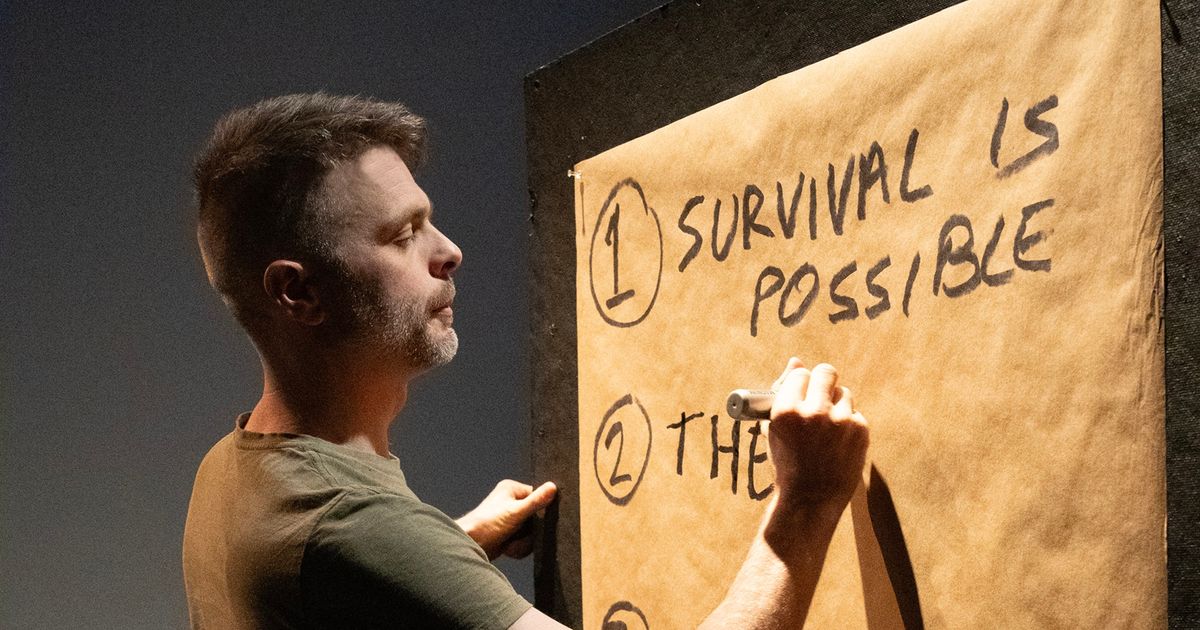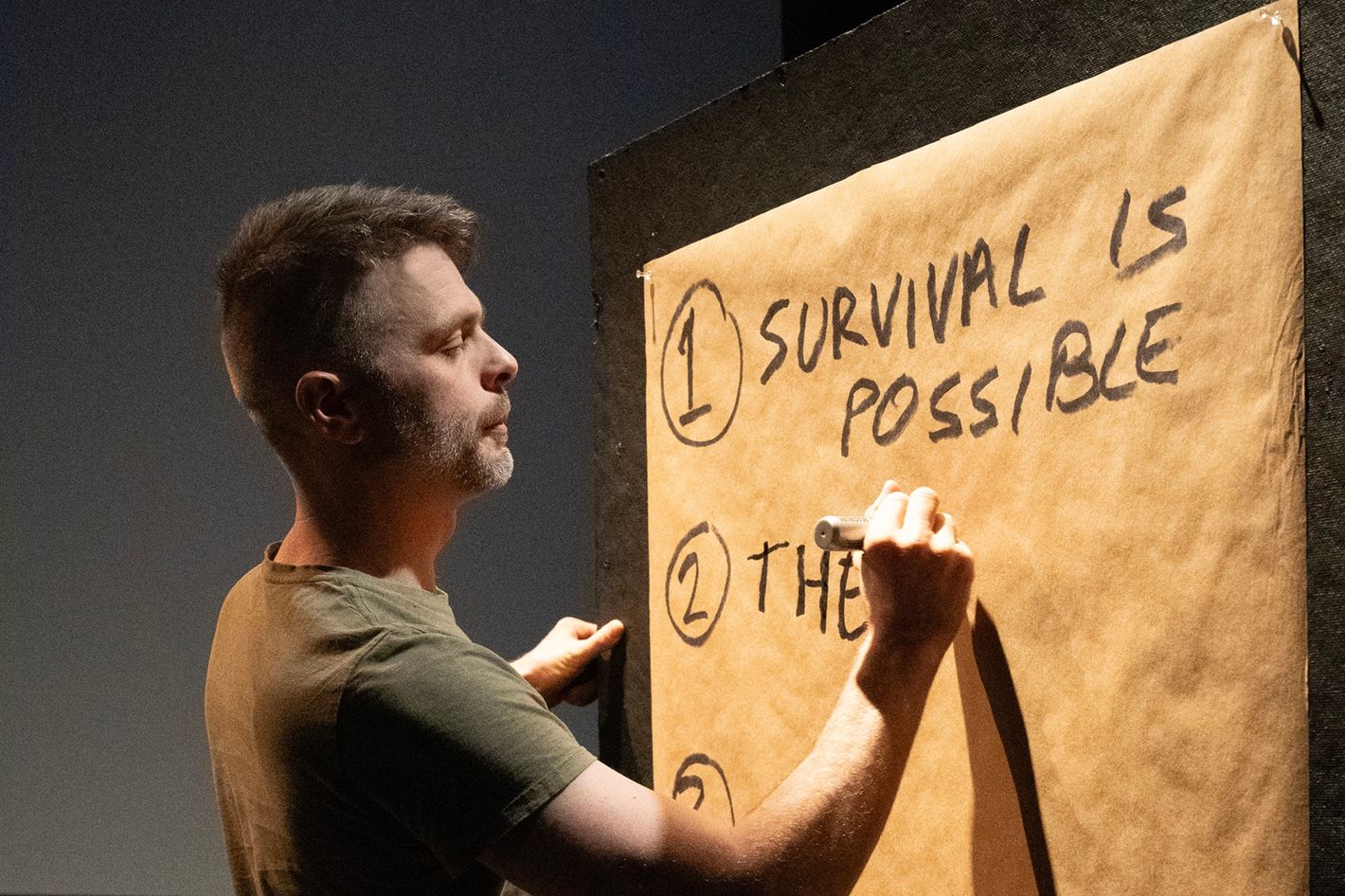Climate Hopefulness Faces the Fire in Deep History
David Finnigan’s play starts as lecture, then takes a turn.


In the couple of days since I saw Deep History at the Public, I’ve found myself in the uncomfortably familiar position of reading about yet another once-in-a-lifetime climate event: Hurricane Milton comes just weeks after the damage wrought by Hurricane Helene, all part of a fierce new normal. “Often we talk about climate change like it’s this apocalyptic event that’s on its way and we need to prevent it from hitting,” David Finnigan says in his introduction to Deep History. As the increasing frequency of these kinds of stories makes clear, there is a second mental leap required: A crisis is no longer merely on the way. “There’s no before and after — we’re in it, and we’ll be in it for the rest of our lives.”
Finnigan has set his play during another entry, from nearly five years ago, in the long list of climate crises. Around Christmas 2019, he was living in London, distracted by pop music — he samples as much Caroline Polachek as is possible in an issue play — until he started getting messages from friends and family back home in Australia about the wildfires that had started to consume 29 million acres. Finnigan is a theater-maker by training, though his work often focuses on political inertia (a play provocatively titled Kill Climate Deniers caused controversy in Australia; he has another commission from the Public for a larger work in 2028, when the next IPCC assessment is due to be released). The origins of Deep History lie with Finnigan’s father, a climate scientist. As those wildfires hit, he had recently been hospitalized, and he encouraged his son to draft a work about how humanity, “an adolescent species,” could learn from its past to rise to the moment. Crucially, this is all told within the setting of late 2019. Finnigan says up top that he’s decided to preserve the text he wrote over a tense 72-hour period, intercut with observations from five years down the line and updates from his best friend, who was trapped by the fires in Canberra. He weighs the potential for optimism about human adaptability, essentially, against the knee-jerk fear and selfishness of acting in a crisis.
Due to that structure, Finnigan dedicates the bulk of Deep History to something like a guest lecture, and it’s tonally deadening. Even with the insertions of pop music, you long for something more Dionysian out of Finnigan, the kind of madness that made NYTW’s Hurricane Diane, which sticks in my mind as one of the most brutally observant comedies about climate complacency, so effective. Here, Finnigan is gawky and eager in a T-shirt and jeans, with a few helpful props on hand, determined to tick all the boxes just so. He’ll narrate the experience of six individuals during six crises for humanity, ranging as far back as 50,000 to 100,000 years ago, when a supervolcano eruption nearly wiped out early homo sapiens, up to the more recent challenges of colonialism and nuclear weapons. The vignettes are all told with she/her pronouns in front of looping museum-montage PowerPoint slides. He scoops sugar (high-quality stuff from the nearby Astor Place Wegmans, he jokes, because the Public gave him a budget) into a funnel to represent our geometrically increasing population. It’s all thorough and hollow. He starts with a land acknowledgment, squeezes in a tangent about the colonial history of sugar production, and arrives at canned takeaways: We’ve been through worse but made it out when others didn’t — suck it, Neanderthals.
But wait. As fires draw closer to Canberra, the hollowness of Finnigan’s in-the-moment lecture becomes Deep History’s broader point. From the vantage of 2024, he sees how, in a crisis, he fell prey to defensive, survivalist thinking, and he wants to challenge his audience to imagine how to think about these pivot points differently. The rhetorical move is effective, like pulling a tablecloth from a fully set table, but it’s also familiar. You sit there thinking Wow, and then later wonder, Hold on — are we actually going to eat? Deep History, like a lot of work that lives in the muddy space among comedy, lecture, and theater, made a stop at the Edinburgh Fringe Festival. Many pieces in that tradition press a similar kind of “Wait, should I be saying this?” escape button, priming themselves to self-destruct — see Alex Edelman’s Just for Us (“Should I really be telling this story about Nazis?”) and Hannah Gadsby’s Nanette (“Should I really be doing comedy?”), or works that accumulated a lot more production value, like Baby Reindeer (“Should I really be encouraging my stalker?”) or even the musical Six (“Is a competition between ex-wives also kinda sexist anyway?”). The structural gambit lends short, cheap pieces like Deep History, which runs to 70 minutes, a level of expansiveness they might not be able to achieve otherwise and sends you out the door with a grabby level of surprise and some tantalizing open questions. (And, in this case, a needle drop.) But then you think, How about we examine those open questions? “So how can we reconcile clear-headedness with an appropriate sense of immediacy?” “If baseline survival at all costs isn’t the right metric, what is?” Art need not have the answers here, but you’d like Finnigan to spend a little more time in the process of synthesis, spelunking around in the dark pondering what they might be.
Deep History is at the Public Theater through November 10.
Related








